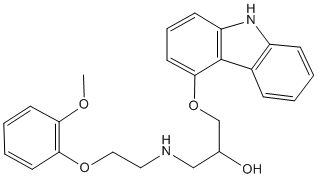All AbMole products are for research use only, cannot be used for human consumption.

Carvedilol is a non-selective beta blocker/alpha-1 blocker with an IC50 of 3.8 μM for inhibition of LDL oxidation. Norepinephrine stimulates the nerves that control the muscles of the heart by binding to the β1- and β2-adrenergic receptors. Carvedilol blocks the binding to those receptors, which both slows the heart rhythm and reduces the force of the heart’s pumping. This lowers blood pressure and reduces heart failure. Norepinephrine also binds to the α1-adrenergic receptors on blood vessels, causing them to constrict and raise blood pressure. Carvedilol blocks this binding to the α1-adrenergic receptors too, which also lowers blood pressure.
| Molecular Weight | 406.47 |
| Formula | C24H26N2O4 |
| CAS Number | 72956-09-3 |
| Solubility (25°C) | DMSO 80 mg/mL |
| Storage |
Powder -20°C 3 years ; 4°C 2 years In solvent -80°C 6 months ; -20°C 1 month |
| Related Adrenergic Receptor Products |
|---|
| Indoramin
Indoramin is a selective α1A-adrenoceptor antagonist. |
| Ro 363 hydrochloride
Ro 363 hydrochloride is a potent and highly selective β1-adrenoceptor agonist. Ro 363 hydrochloride is also an effective inotropic stimulant. Ro 363 hydrochloride is a cardiovascular modulator that reduces diastolic blood pressure and pronounces increases in myocardial contractility. |
| Phentolamine
Phentolamine is a potent, selective and orally active α1 adrenergic and α2 adrenergic receptor antagonist. |
| Dipivefrin
Dipivefrin is a potent adrenergic agonist. |
| HOKU-81
HOKU-81 (4-Hydroxytulobuterol) is one of the metabolites of Tulobuterol. |
All AbMole products are for research use only, cannot be used for human consumption or veterinary use. We do not provide products or services to individuals. Please comply with the intended use and do not use AbMole products for any other purpose.


Products are for research use only. Not for human use. We do not sell to patients.
© Copyright 2010-2024 AbMole BioScience. All Rights Reserved.
